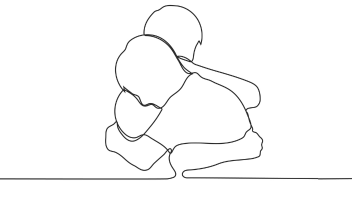“The fundamental purpose of the condolence call during shivah is to relieve the mourner of the intolerable burden of intense loneliness,” Rabbi Maurice Lamm wrote in his popular book, The Jewish Day in Death and Mourning. “All the traditions of mourning express this troubled loneliness in diverse ways, covering the spectrum of social life—from the excessive growing of hair in indifference to social custom, to the avoidance of greetings, the minimum social courtesy.”
In order for the bereaved to be comforted, there must be comforters. The laws and guidelines for visitors range from what to say, where to sit, and what to bring. We selected three Talmudic teachings that speak to those different aspects and offer a new lens for us to think about the way we show up for those who need us most.
1. Moed Katan 28b-29a: How (and When) to Speak
After Aharon’s two sons—Nadav and Avihu—are killed for bringing a “strange fire” into the Tent of Meeting, the Torah famously records “vayidom Aharon,” and Aharon was silent. Sometimes there is nothing to say, nothing that should be said. When you lose your two children in an instant, what could be said?
Humans are unique creatures in our ability to speak, but as seen by Aharon, speech is not always a good thing. Indeed, Shimon teaches in Pirkei Avot 1:17, “All my days, I grew up among the Sages, and I found nothing better for a person than silence.” This first Talmudic teaching provides one such example.
.אָמַר רַבִּי יוֹחָנָן: אֵין מְנַחֲמִין רַשָּׁאִין לוֹמַר דָּבָר עַד שֶׁיִּפְתַּח אָבֵל, שֶׁנֶּאֱמַר: ״אַחֲרֵי כֵן פָּתַח אִיּוֹב אֶת פִּיהוּ״, וַהֲדַר: ״וַיַּעַן אֱלִיפַז הַתֵּימָנִי״
Rabbi Yoḥanan said: The consolers are not permitted to speak words of consolation until the mourner opens and speaks first. As it is stated: “And they sat down with him upon the ground for seven days and seven nights, and none spoke a word to him; for they saw that his suffering was very great. After this Job opened his mouth” (Job 2:13–3:1). And afterward: “And Eliphaz the Temanite answered and said” (Job 4:1).
This rule is effective. People with good intentions make poor choices in uncomfortable situations, and sitting silently beside a mourner is not easy. But sometimes it’s best not to fill the noise. When we do speak, however, there should always be an intentionality, a certain mindfulness at play—especially in the context of death. The Talmud says as much on the next page.
וְאָמַר רַבִּי לֵוִי בַּר חַיְתָא: הַנִּפְטָר מִן הַמֵּת, לֹא יֹאמַר לוֹ ״לֵךְ לְשָׁלוֹם״, אֶלָּא ״לֵךְ בְּשָׁלוֹם״. הַנִּפְטָר מִן הַחַי, לֹא יֹאמַר לוֹ ״לֵךְ בְּשָׁלוֹם״, אֶלָּא ״לֵךְ לְשָׁלוֹם״. הַנִּפְטָר מִן הַמֵּת, לֹא יֹאמַר לוֹ ״לֵךְ לְשָׁלוֹם״, אֶלָּא ״לֵךְ בְּשָׁלוֹם״, שֶׁנֶּאֱמַר: ״וְאַתָּה תָּבֹא אֶל אֲבוֹתֶיךָ בְּשָׁלוֹם״. הַנִּפְטָר מִן הַחַי, לֹא יֹאמַר לוֹ ״לֵךְ בְּשָׁלוֹם״, אֶלָּא ״לֵךְ לְשָׁלוֹם״, שֶׁהֲרֵי דָּוִד שֶׁאָמַר לְאַבְשָׁלוֹם ״לֵךְ בְּשָׁלוֹם״, הָלַךְ וְנִתְלָה, יִתְרוֹ שֶׁאָמַר לְמֹשֶׁה ״לֵךְ לְשָׁלוֹם״, הָלַךְ וְהִצְלִיח
And Rabbi Levi bar Ḥayyata said: One who departs from the deceased should not say to him: Go to peace, but rather he should say: Go in peace. One who departs from the living should not say to him: Go in peace, but rather he should say: Go to peace. One who departs from the deceased should not say to him: Go to peace, but rather: Go in peace, as it is stated: “And you shall go to your fathers in peace; you shall be buried in a good old age” (Genesis 15:15).One who departs from the living should not say to him: Go in peace, but rather: Go to peace, as David said to Absalom: “Go in peace” (II Samuel 15:9), and he subsequently went and was hanged; whereas Jethro said to Moses: “Go to peace” (Exodus 4:18), and he went and was successful.
2. Ketubot 72a: How to Dignify
“Who is respected?” Ben Zoma asks in Pirkei Avot 4:1. “One who respects other people.” The Torah goes to great lengths to preserve human dignity, and that courtesy is aptly extended beyond just the living. When a Jewish man visits a cemetery, he is required to tuck in his tzizit so as not to “mock the dead” by flaunting a mitzvah they can no longer perform. In this next passage, we see another example of dignifying those who left us—this time in the aftermath of their death.
תַּנְיָא הָיָה רַבִּי מֵאִיר אוֹמֵר מַאי דִּכְתִיב טוֹב לָלֶכֶת אֶל בֵּית אֵבֶל מִלֶּכֶת אֶל בֵּית מִשְׁתֶּה בַּאֲשֶׁר הוּא סוֹף כּל הָאָדָם וְהַחַי יִתֵּן אֶל לִבּוֹ מַאי וְהַחַי יִתֵּן אֶל לִבּוֹ דְּבָרִים שֶׁל מִיתָה דְּ[יִ]סְפֹּד יִסְפְּדוּנֵיהּ דְּ[יִ]קְבַּר יִקְבְּרוּנֵיהּ דִּידַל יְדַלּוּנֵיהּ דִּ[י]לַוֵּאי יְלַוּוֹנֵיהּ דְּ[יִ]טְעֹן יִטְעֲנוּנֵיהּ
It is taught in a baraita: Rabbi Meir used to say: What is the meaning of that which is written: “It is better to go to a house of mourning than to go to a house of feasting, since that is the end of all men, and the living will take it to heart” (Ecclesiastes 7:2)? What does “and the living will take it to heart” mean? It means that they will take matters relating to death to heart, realizing that they too will eventually die. He who eulogizes others, people will eulogize him; he who buries someone, people will bury him; he who lifts others to bring them to burial, people will similarly lift him to bring him to burial; he who escorts others out for burial, people will similarly escort him; he who carries others, others will carry him. Therefore, one who does not come to a house of mourning to comfort the bereaved will himself not be treated with proper dignity when he dies.
3. Shabbat 152a-b: Comforting the Deceased
The mourning process is to a large extent for the mourners, as Rabbi Lamm explained earlier. So, if there are no mourners, such as in a case where the deceased had no family, then nothing should take place beyond the burial and eulogy. Yet, as the Talmud tells us, that is not what happens. The community must stand up and comfort the deceased themselves, namely by mourning them.
אָמַר רַב יְהוּדָה: מֵת שֶׁאֵין לוֹ מְנַחֲמִין — הוֹלְכִין עֲשָׂרָה בְּנֵי אָדָם וְיוֹשְׁבִין בִּמְקוֹמוֹ. הָהוּא דִּשְׁכֵיב בְּשִׁבָבוּתֵיהּ דְּרַב יְהוּדָה, לֹא הָיוּ לוֹ מְנַחֲמִין, כּל יוֹמָא הֲוָה דָּבַר רַב יְהוּדָה בֵּי עַשְׂרָה, וְיָתְבִי בְּדוּכְתֵּיהּ. לְאַחַר שִׁבְעָה יָמִים אִיתְחֲזִי לֵיהּ בְּחֶילְמֵיהּ דְּרַב יְהוּדָה, וַאֲמַר לֵיהּ: תָּנוּחַ דַּעְתְּךָ שֶׁהִנַּחְתָּ אֶת דַּעְתִּי.
Rav Yehuda said: In the case of a deceased person who has no comforters, i.e., he has nobody to mourn for him, ten people should go and sit in his place and accept condolences. The Gemara relates the story of a certain person who died in Rav Yehuda’s neighborhood and who did not have any comforters, i.e., mourners; every day of the seven-day mourning period, Rav Yehuda would take ten people and they would sit in his place, in the house of the deceased. After seven days had passed the deceased appeared to Rav Yehuda in his dream and said to him: Put your mind to rest, for you have put my mind to rest.
Postscript: Connecting and Suffering
“During the course of a lifetime, virtually no one can avoid an encounter with death,” Dr. Emanuel Rackman, chancellor of Bar Ilan University, wrote in the preface to Rabbi Lamm’s book. “Yet it is an experience for which one is rarely prepared.” Loss often comes without warning. Though we wish it were the case, we cannot take away the pain of the bereaved. Torah knows this, so it asks no such thing. Onlookers of loss, of grief, are there to comfort and console the mourners and the mourned. We do so by showing up.
One naturally may feel a disconnect from another’s distress. If they did not know the deceased, then how can they cry? Rabbi Joseph B. Soloveitchik explains in his Kol Dodi Dofek that such an ask is fundamental to Jewish peoplehood; we all must cry with one another. His words enliven these texts with rich emotion:
A feeling of empathy is a basic fact in the consciousness of shared Jewish fate. The suffering of one segment of the nation is the lot of the entire community. The scattered and separated people mourns and is consoled together. Prayer, the cry, and the consolation were formulated, as I emphasized above, in the plural… When one enters the house of a mourner to comfort him and to wipe the tear from the bereaved’s sad face, he directs his words of condolence to “all the mourners of Zion and Jerusalem.” The slightest disturbance in the state of an individual or a sector of the people should trouble all segments of the nation throughout their dispersion. It is forbidden and it is impossible for the individual to isolate himself from his fellow and not participate in his suffering.








